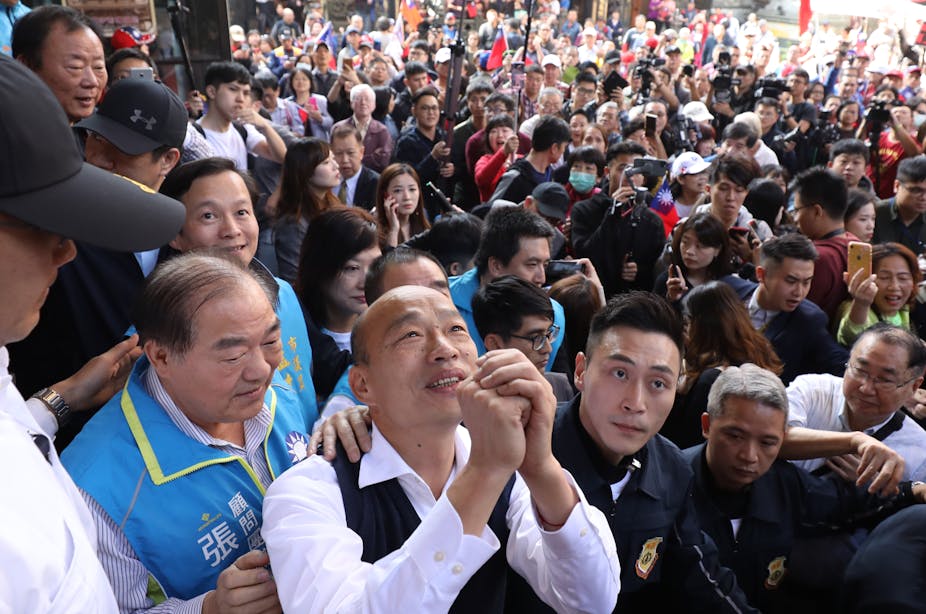As Taiwan heads to the polls on January 11, the future of its relationship with China has remained centre stage in the election campaign.
The result of the parliamentary and presidential elections could also influence Chinese-American competition in the Asia-Pacific region and the broader international security environment.
Taiwan’s current president, Tsai Ing-wen, is the candidate for the incumbent Democratic Progress Party (DPP), while Han Kuo-yu, the mayor of Kaohsiung City, is the candidate for the Kuomintang (KMT), the other of the two mainstream parties.
The KMT represents conservative groups in the country and supports the one-China principle, which recognises that both Taiwan and the mainland belong to one “China”, though it has a different interpretation of the principle to Beijing, which claims that there is only one China called the People’s Republic of China and Taiwan is an inseparable part of it.
The DPP, on the other hand, is a centre-left party that pushes for Taiwanese autonomy from China and stays closer to the Americans.
Taiwan’s politics often resemble a TV drama with a lot of twists and turns. At least three storylines are shaping the current campaign.
Populism in Taiwan
First, populism has begun to affect Taiwanese politics in a way it hasn’t in the past. In 2018, Han unexpectedly won the election to become mayor of Kaohsiung City after a 17-year political exile, ending the 30-year rule of the DPP in the city.
Han’s slogan of “Making Kaohsiung Great Again” unsurprisingly won him the title of the “Taiwanese Trump” and since then a “Han wave” has swept across Taiwan and won him significant popularity.
Han claims to represent Taiwan’s working class and seeks to remind other politicians not to forget the “suffering ordinary people”. He adopts simple and humorous language, portraying himself as an “old, poor and bald-headed” man. His supporters refer to him as the “president of the common people”.
Deliberately alienating himself from the KMT’s traditional political elites, he chose an independent politician as his vice-presidential running mate. Han has also accused the DPP government of corruption.
It’s always about China
Second, the relationship between Taiwan and the Chinese mainland remains a prominent issue in this election. The ongoing tensions between Hong Kong and China and the protests in Hong Kong have ensured that 2020 general election has been focused on the type of relationship that Taiwan should have with the mainland. Specific policies aren’t the issue, the talk is of the bigger, long-term picture.
Both the KMT and the DPP reject the “one country, two systems model” for Taiwan that currently governs Hong Kong’s relationship with China. Nevertheless, the DPP has been accused by the KMT of using the Hong Kong protests for political purposes with slogans such as “Today’s Hong Kong, tomorrow’s Taiwan”. The DPP blames the KMT for being soft and cowardly towards Beijing and claims that only the DPP can protect Taiwan from being annexed by mainland China.
If the DPP wins the election in 2020, it will raise concerns that hostility between the Taiwanese government and Beijing could escalate and may eventually destabilise the security of the whole region.

By manipulating anti-mainland sentiment, the DPP has widened its lead over the KMT in the polls. That’s happened despite the current DPP regime lacking notable achievements and being plagued by corruption scandals and diplomatic crises. Still, Han has appealed to his supporters to pretend to support Tsai if they are asked by pollsters in the opinion polls.
Swing voters
Still, the DPP’s victory is not assured. That’s partly because more than 30% of electors fall into the category of swing voters, creating room for minority parties while also making the election more unpredictable. For example, Ko Wen-je, the current mayor of Taipei, established the Taiwan People’s Party (TPP) in August 2019 and then nominated 45 candidates to run in the 2020 parliamentary election. The TPP criticises both of the two mainstream political parties and has a stable approval rating around 10% based on current opinion polls.
Over and beyond the TPP, 45 parties have nominated candidates for the 2020 parliamentary election. The leading minority parties, including the TPP, are trying to win enough seats to position themselves as political power brokers and could even be involved in a coalition government in the event of a hung parliament. In the last parliamentary election in 2016, the DPP won 68 out of the 113 seats while KMT won only 35 seats. In 2020, it will be very challenging for the DPP to win an overall majority.
The election campaign has been dominated by ongoing drama. In 2019, allegations were made by two scholars about the validity of Tsai’s doctorate – something she denies and is pursuing legal action over for defamation. Although the university, LSE, confirmed that she did receive a PhD in law in 1984, some Taiwanese still remain sceptical and the issue has continued to plague her during the election campaign. Meanwhile, the Taiwan election campaign has been beset by allegations of misinformation and fake news on all sides.
Nothing is ever dull in Taiwanese politics. Whoever wins the election will need to balance both the relationship between mainland China and Taiwan and the US and the island and also boost the country’s economy.

